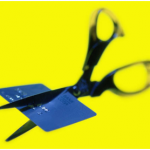Manage Your Debt - Let's Explore Your Options
GET STARTED NOWThe Truth About Closing a Credit Card?

Many people are under the misconception that closing a credit card will damage their credit score. While this may be true in some circumstances, there are many instances in which it will not hurt you. Below are the important factors to consider when deciding whether to close a credit card account.
Credit card utilization
Do you still owe a balance on the credit card? If you do, this is probably NOT the time to close the card. By electing to close a card before it is paid off, you effectively lower your available credit limit-to-credit balance ratio (utilization ratio). To have a good credit limit ratio, you need to keep card balances at 30% or less of your available credit limit. When you close a card with a balance on it, you effectively lower the credit limit to the level of the current balance.
Here is an example:
- Open card – Credit limit is $1,000; current balance owed is $300. Ratio = 30%
- Closed card – Credit limit is $300; current balance owed is $300. Ratio = 100%
- That 100% is very hard on your credit score.
It is important to note, that the utilization rate does not necessarily look at one card at a time. If you have multiple credit cards, it will consider the debt you carry on all cards compared to the available credit limit on all cards.
Example:
- Card #1 – Credit limit is $1,000; current balance is $800. Ratio = 80%
- Card #2 – Credit limit is $1,000; current balance is $200. Ratio = 20%
- Overall utilization rate: credit limit $2,000; current balance is $1,000 Ratio = 50%
If I close the card, it will come off my credit report?
Another misconception about closing cards is that the card will be removed from the credit report after seven years. The truth is that positive credit history can remain on your credit report forever; even if you close the account. The only items required to come off a report in seven years are negative entries (10 years for some items like bankruptcy and judgments). It is true that items that have not been reported in the last 24 months may not be as heavily weighted in your credit score; however they will still be included.
Need your score any time soon?
Finally, think about how you may be using your credit in the next six-to-12 months. If you are thinking about purchasing a home or a car, you may do better to wait to make changes to your credit until after you have completed the purchase. It is certainly not a time to be opening new credit accounts or incurring additional debt on existing accounts. At that point hopefully you are focusing on paying down any credit card debt you may already have.
Bottom line, if you are considering closing your credit card accounts, make sure the account is paid-in-full first. Also, understand that the account will remain on your credit report (if positive), which is a GOOD thing!
If you have questions about how to manage your debts and credit cards, call us! 1-888-864-8659.
Published Oct 27, 2011.
